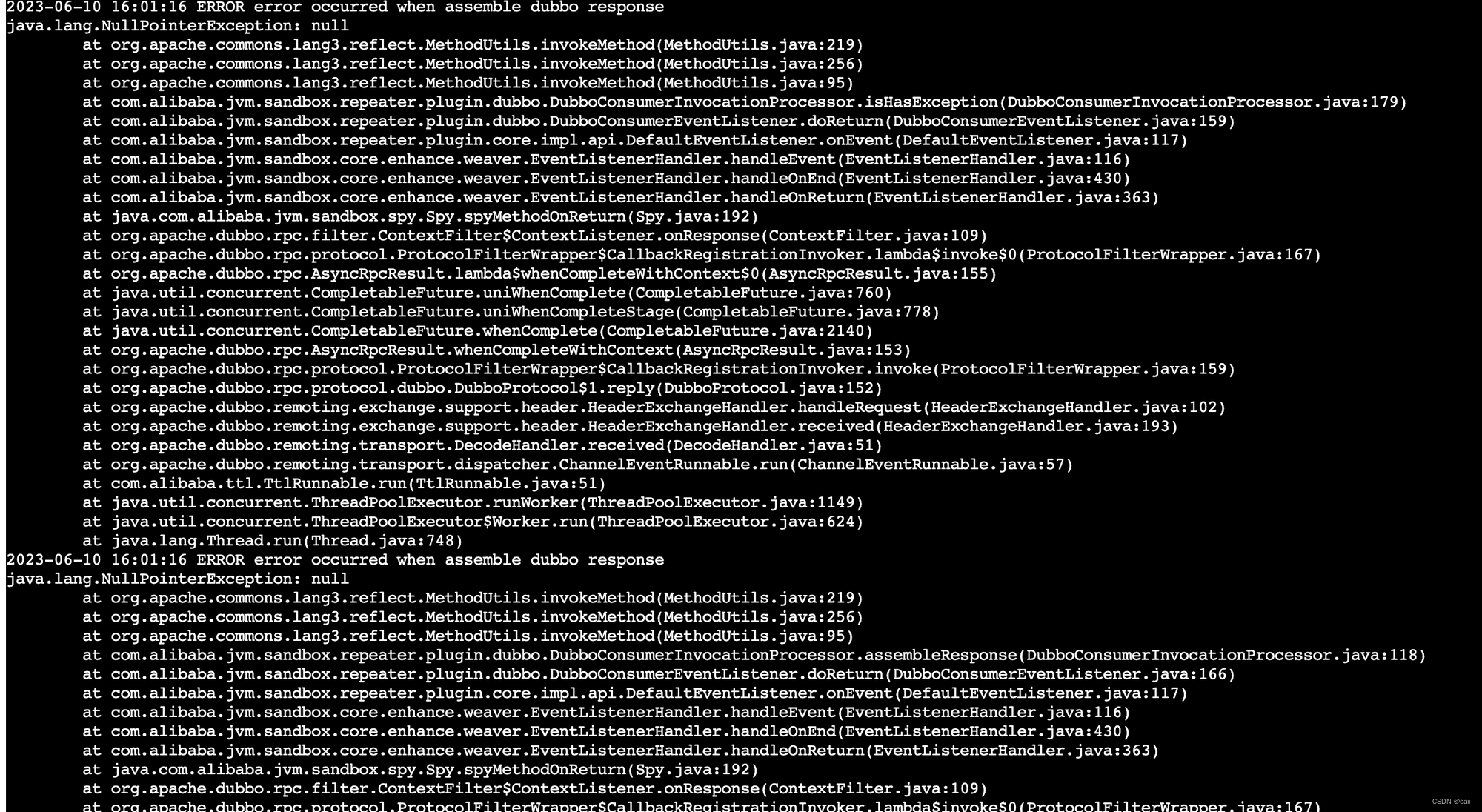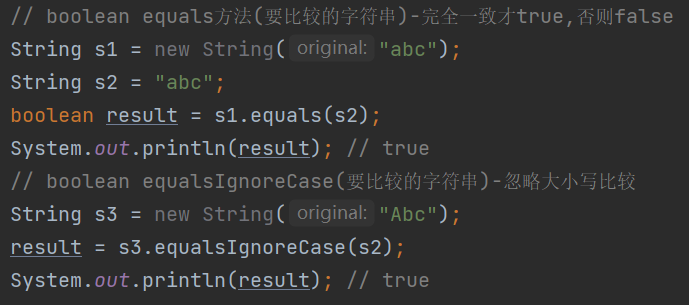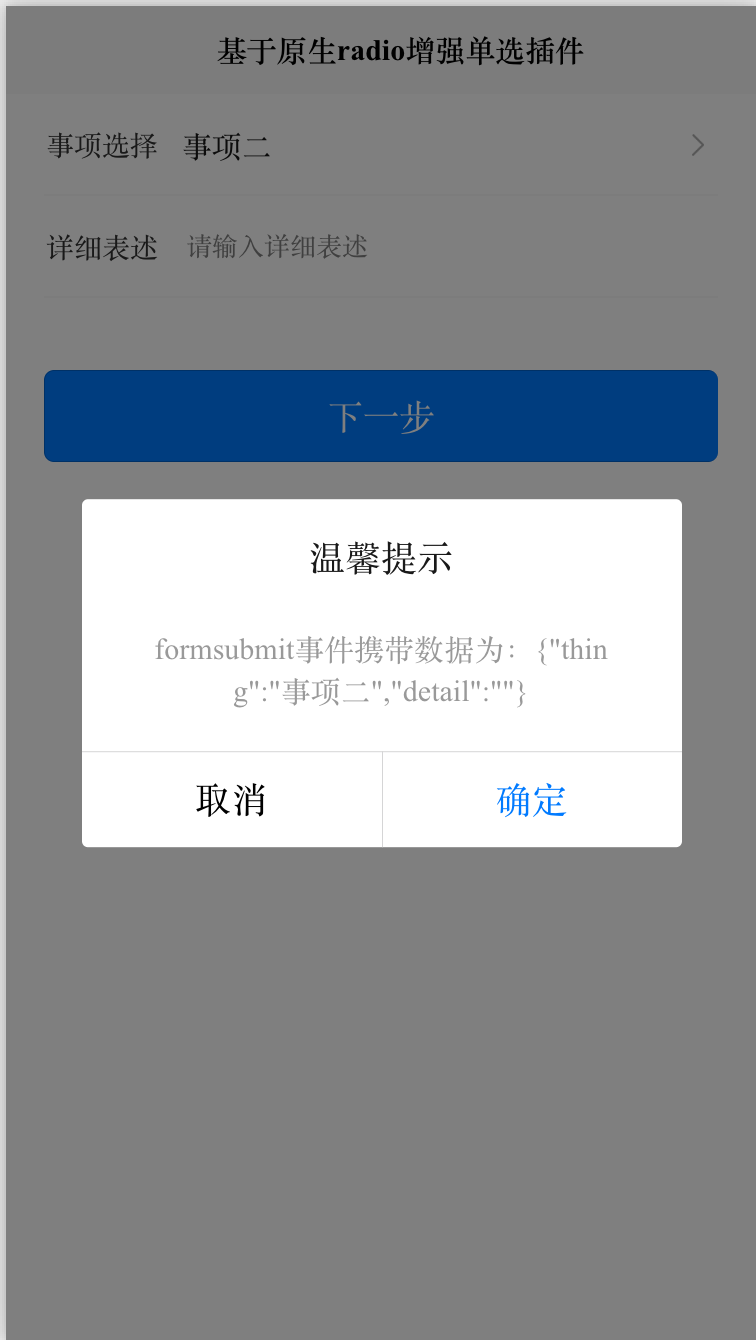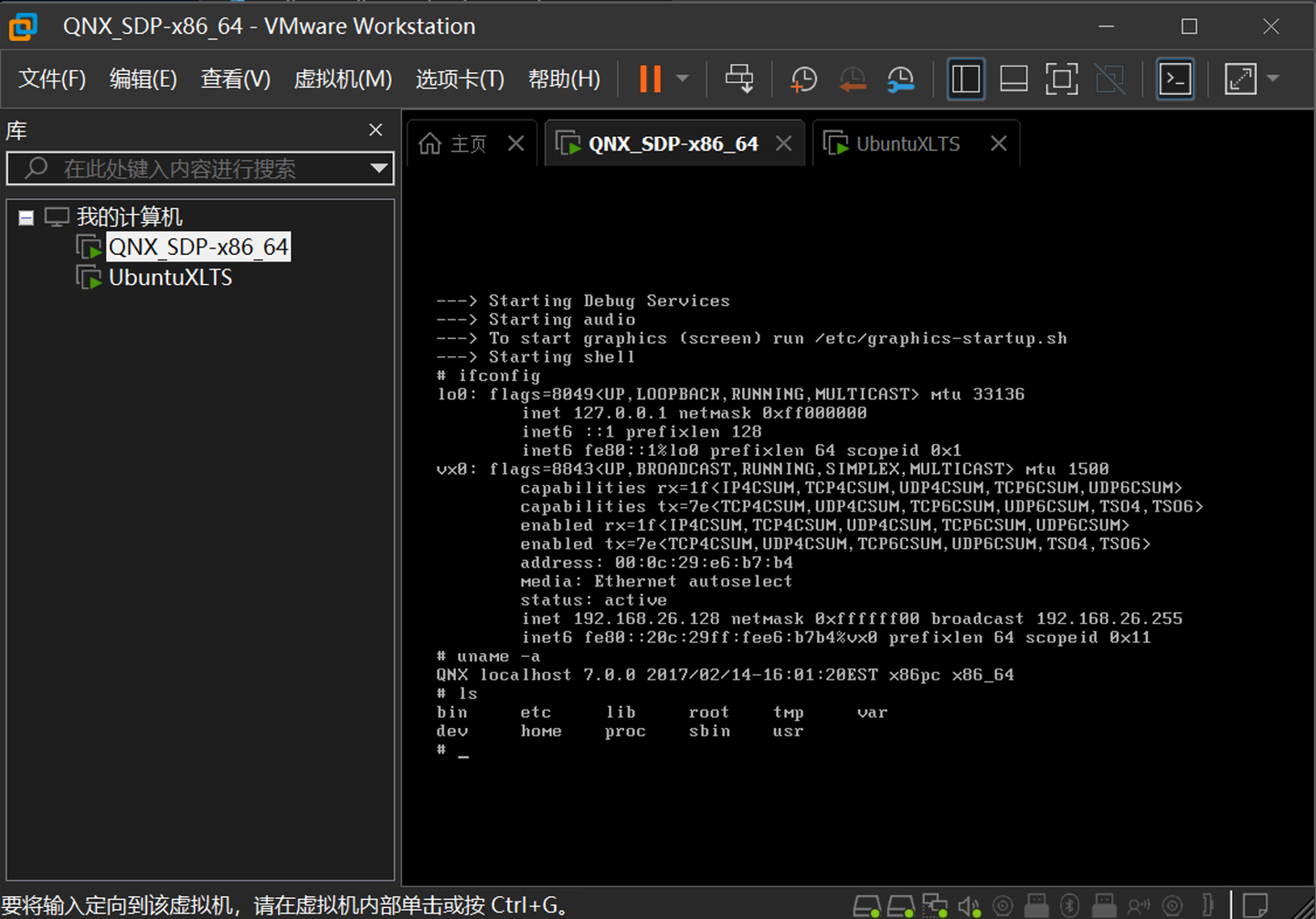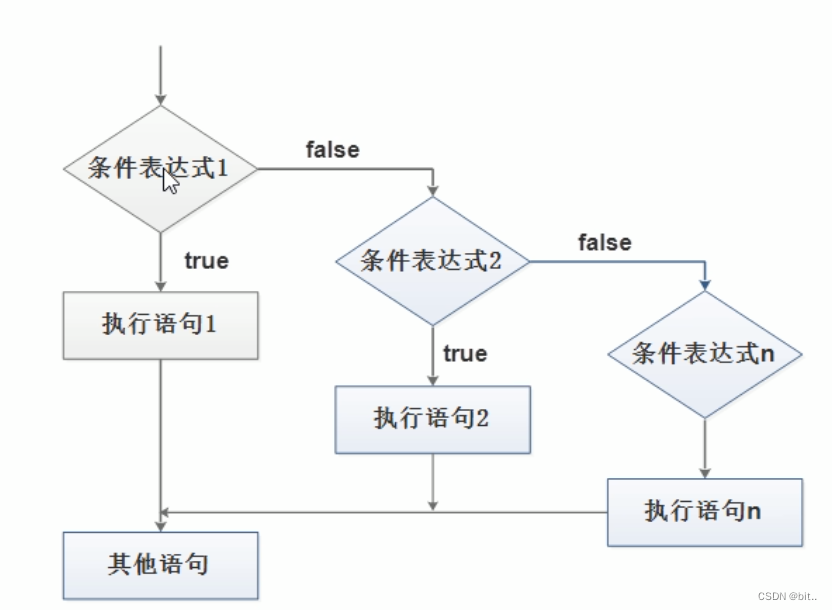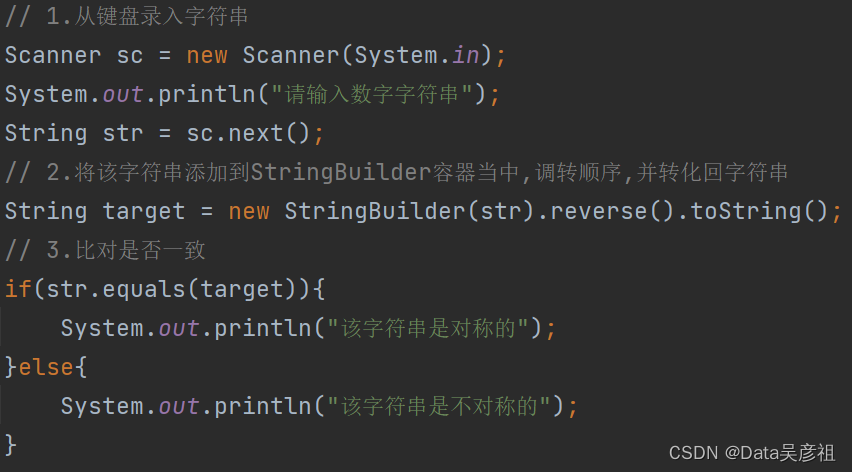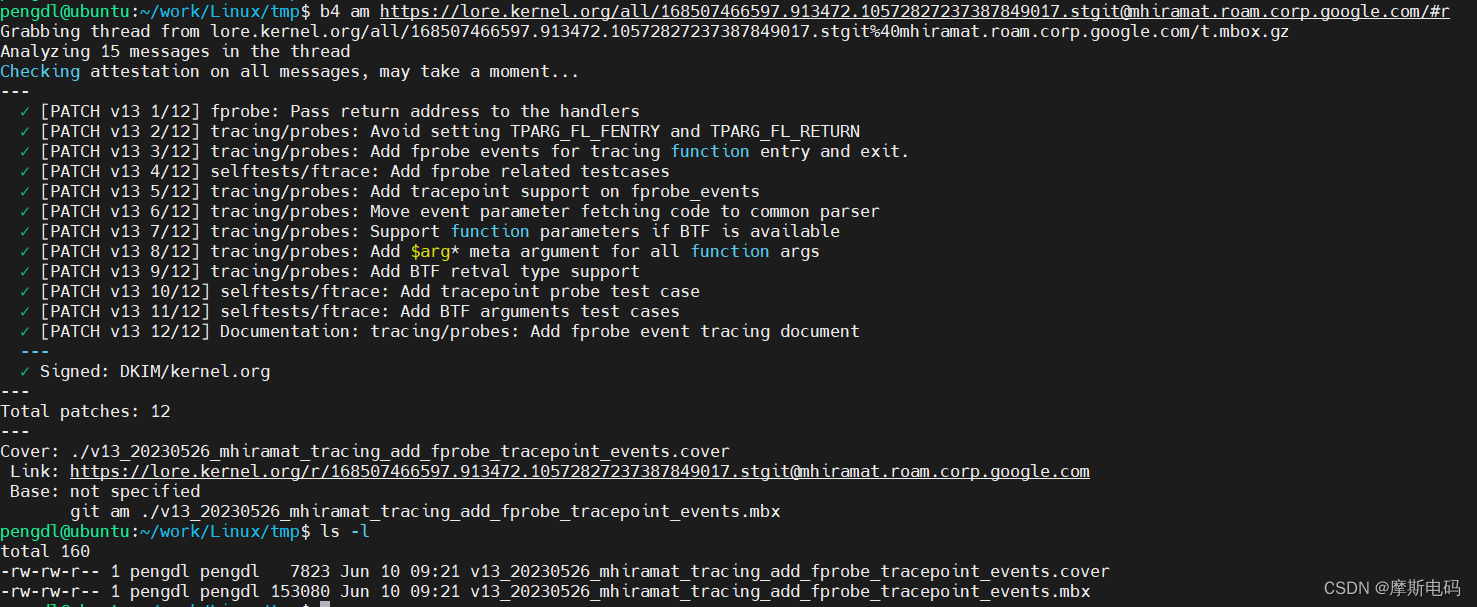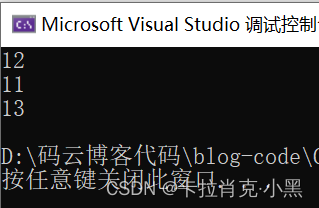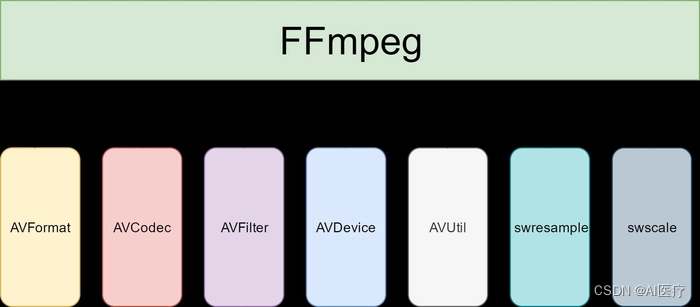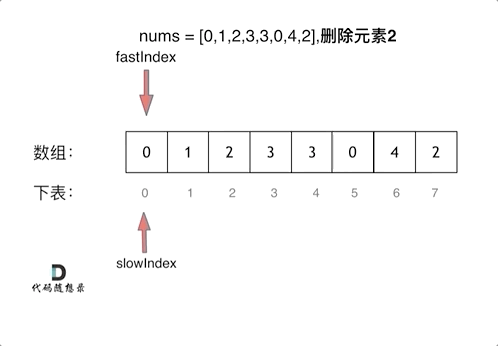OMG--IDL(Interface Definition Language)
- 1 概述
- 2 内容
- 缩写
- IDL 语法和语义概述
- 词法约定
- ISO Latin-1的字母字符如下表
- 十进制数字字符
- 图形字符
- 格式化字符
- Tokens
- 注释
- 标识符
- 冲突规则
- 转义标识符
- 关键字
- IDL识别的其他字符
- 字面量
- 预处理
- IDL 语法
- 构建块核心数据类型
- 构建任何块
- 构建块基本接口
- 构建块完整接口
- 构建块数据类型
- 构建块CORBA实现--接口
- 构建块CORBA实现--数据类型
- 构建块组件--基本
- 构建块组件--homes
- 构建块CCM实现
- 构建块组件--端口和连接器
- 构建模板模块
- 构建块扩展数据类型
- 构建块匿名类型
- 构建块注释
- 构建模块之间的关系
- 3 补充
- 3.1 OMG介绍
- 3.2 CORBA
- XML-RPC / SOAP
- REST
- CORBA 和 gRPC 比较
- 3.3 EBNF(扩展巴科斯范式)
- 参考
1 概述
如下介绍,OMG组织定义的IDL(Interface Definition Language)。
- Version: 4.2
- OMG Document Number: formal/18-01-05
- Release Date: March 2018
- Standard Document URL: http://www.omg.org/spec/IDL/4.2/
2 内容
缩写
| Acronym | Meaning |
|---|---|
| ASCII | American Standard Code for Information Interchange |
| BIPM | Bureau International des Poids et Mesures |
| CCM | CORBA Component Model |
| CORBA | Common Object Request Broker Architecture |
| DDS | Data Distribution Service |
| EBNF | Extended Backus Naur Form |
| IDL | Interface Definition Language |
| ISO | International Organization for Standardization |
| LwCCM | Lightweight CCM |
| OMG | Object Management Group |
| ORB | Object Request Broker |
| XTypes | eXtensible and dynamic topic Types (for DDS) |
IDL 语法和语义概述
- OMG IDL是一种语言,它允许对客户端对象可能使用的接口进行明确的规范(服务器)对象实现提供了所有需要的相关结构,如异常和数据类型。数据需要类型来指定接口操作的参数和返回值。
- IDL是一种纯粹的描述性语言。
- 包含用 IDL 编写的规范的源文件应具有“.idl”扩展名。
列出了EBNF格式中使用的符号及其含义:
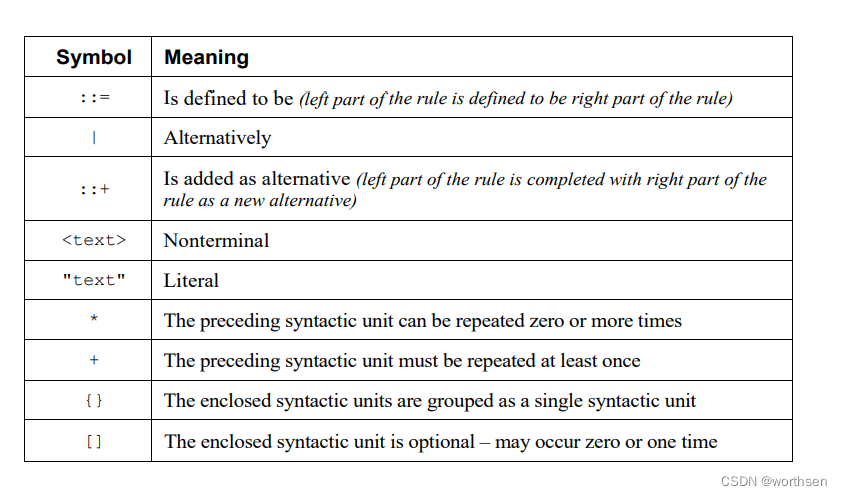
词法约定
词法约定在IDL规范中定义令牌(tokens)并描述注释、标识符、关键字和字面值——整数、字符、浮点常量和字符串字面值。
IDL使用ASCII字符集,除了字符串文字和字符文字,它们使用ISO Latin-1 (8859-1)字符集。ISO Latin-1字符集分为字母(字母)数字、图形字符、字符空格(空白)字符和格式化字符。
ISO Latin-1的字母字符如下表

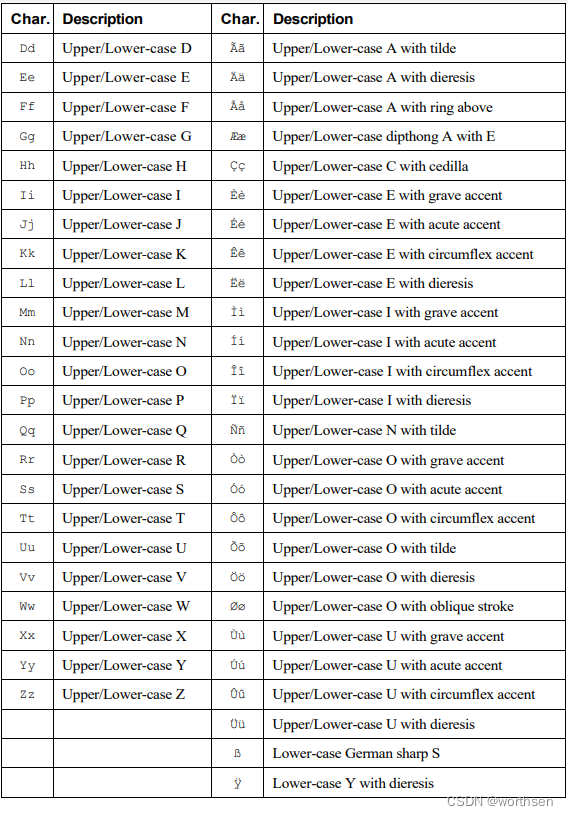
十进制数字字符

图形字符
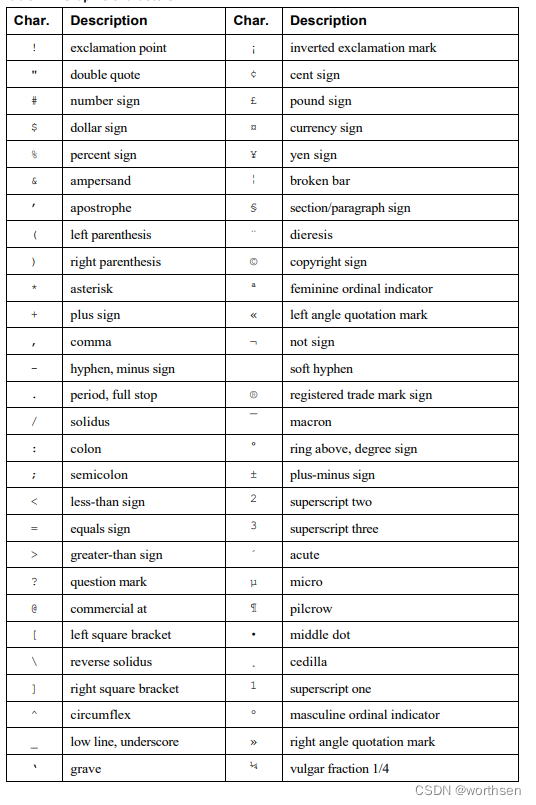
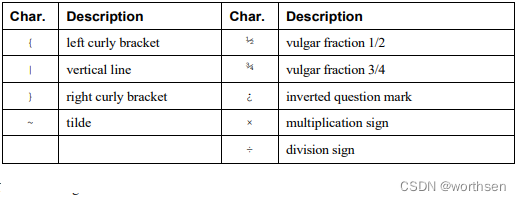
格式化字符
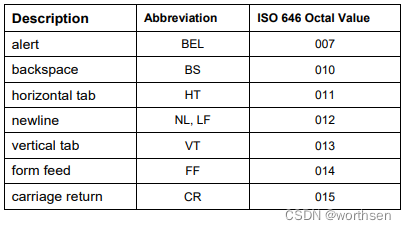
Tokens
有五种tokens:标识符、关键字、文字、操作符和其他分隔符。
注释
字符/开始一个注释,注释以字符/结束。这些注释不能嵌套。
字符//开始一个注释,该注释在它们出现的行结束。
标识符
标识符是由ASCII字母、数字和下划线(_)字符组成的任意长序列。第一个字符必须是ASCII字母字符。所有字符都是重要的。IDL标识符不区分大小写。但是,对定义的所有引用必须使用与定义相同的大小写发生。这允许对区分大小写的语言进行自然映射。
冲突规则
- 大写字母和小写字母被视为相同的字母。
- 在每个作用域中,IDL标识符只有一个名称空间。使用相同的标识符用于常量和接口,例如,会产生编译错误。
module M {
typedef long Foo;
const long thing = 1;
interface thing { // Error: reuse of identifier thing
void doit (
in Foo foo // Error: Foo and foo collide…
); // … and refer to different things
readonly attribute long Attribute; // Error: Attribute collides with keyword…
// … attribute
};
};
转义标识符
- 和所有语言一样,IDL使用一些保留字,称为关键字。
- 随着IDL的发展,添加到IDL语言中的新关键字可能会无意中与中使用的标识符冲突现有的IDL和使用该IDL的程序。修复这些冲突不仅需要修改IDL,还需要依赖于该IDL的编程语言代码也必须更改。的语言映射规则重命名的IDL标识符将导致映射的标识符名称(例如,方法名称)被更改。
- 为了尽量减少工作量,用户可以在词法上通过在an前面加上下划线(_)来“转义”标识符标识符。这是一个纯粹的词法约定,只关闭关键字检查。结果标识符紧随其后标识符处理的其他规则。例如,标识符_AnIdentifier被当作AnIdentifier来处理。
module M {
interface thing {
attribute boolean abstract; // Error: abstract collides with keyword abstract
attribute boolean _abstract; // OK: abstract is an identifier
};
};
关键字
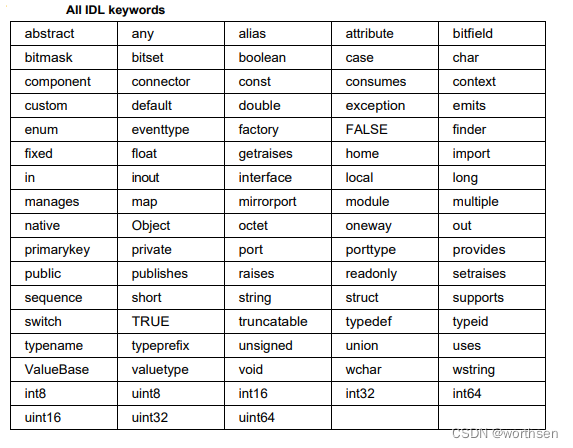
module M {
typedef Long Foo; // Error: keyword is long not Long
typedef boolean BOOLEAN; // Error: BOOLEAN collides with the keyword…
// …boolean;
};
IDL识别的其他字符
- 标点符号

- 记号

字面量
- Integer
- Character
- Floating-point
- String
- Fixed-point
转义字符
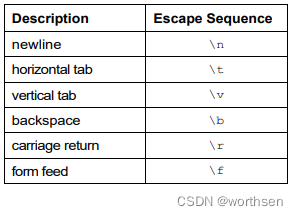
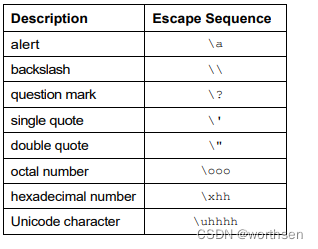
字符串是以空结尾的字符序列。如果字符串由非宽字符组成,则为字符串类型;如果字符串由宽字符组成,则为wstring(宽字符串)类型。
const string S1 = "Hello";
const wstring S2 = L"Hello";
预处理
IDL应按照ISO/IEC 14882:2003中预处理器的规范进行预处理。预处理器可以作为单独的进程实现,也可以内置于IDL编译器中。
IDL 语法
格式良好的IDL规范的语法是用扩展巴科斯范式表示的规则来描述的(EBNF)。
构建块核心数据类型
The following set of rules form the building block:
(1) <specification> ::= <definition>+
(2) <definition> ::= <module_dcl> ";"
| <const_dcl> ";"
| <type_dcl> ";"
(3) <module_dcl> ::= "module" <identifier> "{" <definition>+ "}"
(4) <scoped_name> ::= <identifier>
| "::" <identifier>
| <scoped_name> "::" <identifier>
(5) <const_dcl> ::= "const" <const_type> <identifier> "=" <const_expr>
(6) <const_type> ::= <integer_type>
| <floating_pt_type>
| <fixed_pt_const_type>
| <char_type>
| <wide_char_type>
| <boolean_type>
| <octet_type>
| <string_type>
| <wide_string_type>
| <scoped_name>
(7) <const_expr> ::= <or_expr>
(8) <or_expr> ::= <xor_expr>
| <or_expr> "|" <xor_expr>
(9) <xor_expr> ::= <and_expr>
| <xor_expr> "^" <and_expr>
(10) <and_expr> ::= <shift_expr>
| <and_expr> "&" <shift_expr>
(11) <shift_expr> ::= <add_expr>
| <shift_expr> ">>" <add_expr>
| <shift_expr> "<<" <add_expr>
(12) <add_expr> ::= <mult_expr>
| <add_expr> "+" <mult_expr>
| <add_expr> "-" <mult_expr>
(13) <mult_expr> ::= <unary_expr>
| <mult_expr> "*" <unary_expr>
| <mult_expr> "/" <unary_expr>
| <mult_expr> "%" <unary_expr>
(14) <unary_expr> ::= <unary_operator> <primary_expr>
| <primary_expr>
(15) <unary_operator> ::= "-"
| "+"
| "~"
(16) <primary_expr> ::= <scoped_name>
| <literal>
| "(" <const_expr>")"
(17) <literal> ::= <integer_literal>
| <floating_pt_literal>
| <fixed_pt_literal>
| <character_literal>
| <wide_character_literal>
| <boolean_literal>
| <string_literal>
| <wide_string_literal>
(18) <boolean_literal> ::= "TRUE"
| "FALSE"
(19) <positive_int_const> ::= <const_expr>
(20) <type_dcl> ::= <constr_type_dcl>
| <native_dcl>
| <typedef_dcl>
(21) <type_spec> ::= <simple_type_spec>
(22) <simple_type_spec> ::= <base_type_spec>
| <scoped_name>
(23) <base_type_spec> ::= <integer_type>
| <floating_pt_type>
| <char_type>
| <wide_char_type>
| <boolean_type>
| <octet_type>
(24) <floating_pt_type> ::="float"
| "double"
| "long" "double"
(25) <integer_type> ::= <signed_int>
| <unsigned_int>
(26) <signed_int> ::= <signed_short_int>
| <signed_long_int>
| <signed_longlong_int>
(27) <signed_short_int> ::="short"
(28) <signed_long_int> ::="long"
(29) <signed_longlong_int> ::="long""long"
(30) <unsigned_int> ::= <unsigned_short_int>
| <unsigned_long_int>
| <unsigned_longlong_int>
(31) <unsigned_short_int> ::="unsigned""short"
(32) <unsigned_long_int> ::="unsigned""long"
(33) <unsigned_longlong_int> ::="unsigned""long""long"
(34) <char_type> ::="char"
(35) <wide_char_type> ::="wchar"
(36) <boolean_type> ::="boolean"
(37) <octet_type> ::="octet"
(38) <template_type_spec> ::= <sequence_type>
| <string_type>
| <wide_string_type>
| <fixed_pt_type>
(39) <sequence_type> ::= "sequence" "<" <type_spec> "," <positive_int_const> ">"
| "sequence" "<" <type_spec> ">"
(40) <string_type> ::= "string" "<" <positive_int_const> ">"
| "string"
(41) <wide_string_type> ::= "wstring" "<" <positive_int_const> ">"
| "wstring"
(42) <fixed_pt_type> ::= "fixed" "<" <positive_int_const> "," <positive_int_const> ">"
(43) <fixed_pt_const_type> ::= "fixed"
(44) <constr_type_dcl> ::= <struct_dcl>
| <union_dcl>
| <enum_dcl>
(45) <struct_dcl> ::= <struct_def>
| <struct_forward_dcl>
(46) <struct_def> ::= "struct" <identifier> "{" <member>+ "}"
(47) <member> ::= <type_spec> <declarators> ";"
(48) <struct_forward_dcl> ::= "struct" <identifier>
(49) <union_dcl> ::= <union_def>
| <union_forward_dcl>
(50) <union_def> ::= "union" <identifier> "switch" "(" <switch_type_spec> ")"
"{" <switch_body> "}"
(51) <switch_type_spec> ::= <integer_type>
| <char_type>
| <boolean_type>
| <scoped_name>
(52) <switch_body> ::= <case>+
(53) <case> ::= <case_label>+ <element_spec> ";"
(54) <case_label> ::= "case" <const_expr> ":"
| "default" ":"
(55) <element_spec> ::= <type_spec> <declarator>
(56) <union_forward_dcl> ::= "union" <identifier>
(57) <enum_dcl> ::= "enum" <identifier>
"{" <enumerator> { "," <enumerator> } * "}"
(58) <enumerator> ::= <identifier>
(59) <array_declarator> ::= <identifier> <fixed_array_size>+
(60) <fixed_array_size> ::= "[" <positive_int_const> "]"
(61) <native_dcl> ::= "native" <simple_declarator>
(62) <simple_declarator> ::= <identifier>
(63) <typedef_dcl> ::= "typedef" <type_declarator>
(64) <type_declarator> ::= { <simple_type_spec>
| <template_type_spec>
| <constr_type_dcl>
} <any_declarators>
(65) <any_declarators> ::= <any_declarator> { "," <any_declarator> }*
(66) <any_declarator> ::= <simple_declarator>
| <array_declarator>
(67) <declarators> ::= <declarator> { "," <declarator> }*
(68) <declarator> ::= <simple_declarator>
构建任何块
(69) <base_type_spec> ::+ <any_type>
(70) <any_type> ::= "any"
构建块基本接口
(71) <definition> ::+ <except_dcl> ";"
| <interface_dcl> ";"
(72) <except_dcl> ::= "exception" <identifier> "{" <member>* "}"
(73) <interface_dcl> ::= <interface_def>
| <interface_forward_dcl>
(74) <interface_def> ::= <interface_header> "{" <interface_body> "}"
(75) <interface_forward_dcl> ::= <interface_kind> <identifier>
(76) <interface_header> ::= <interface_kind> <identifier>
[ <interface_inheritance_spec> ]
(77) <interface_kind> ::= "interface"
(78) <interface_inheritance_spec>
::= ":" <interface_name> { "," <interface_name> }*
(79) <interface_name> ::= <scoped_name>
(80) <interface_body> ::= <export>*
(81) <export> ::= <op_dcl> ";"
| <attr_dcl> ";"
(82) <op_dcl> ::= <op_type_spec> <identifier> "(" [ <parameter_dcls> ] ")" [ <raises_expr> ]
(83) <op_type_spec> ::= <type_spec>
| "void"
(84) <parameter_dcls> ::= <param_dcl> { "," <param_dcl> } *
(85) <param_dcl> ::= <param_attribute> <type_spec> <simple_declarator>
(86) <param_attribute> ::= "in"
| "out"
| "inout"
(87) <raises_expr> ::= "raises" "(" <scoped_name> { "," <scoped_name> } * ")"
(88) <attr_dcl> ::= <readonly_attr_spec>
| <attr_spec>
(89) <readonly_attr_spec> ::= "readonly" "attribute" <type_spec> <readonly_attr_declarator>
(90) <readonly_attr_declarator>
::= <simple_declarator> <raises_expr>
| <simple_declarator> { "," <simple_declarator> }*
(91) <attr_spec> ::= "attribute" <type_spec> <attr_declarator>
(92) <attr_declarator> ::= <simple_declarator> <attr_raises_expr>
| <simple_declarator> { "," <simple_declarator> }*
(93) <attr_raises_expr> ::= <get_excep_expr> [ <set_excep_expr> ]
| <set_excep_expr>
(94) <get_excep_expr> ::= "getraises" <exception_list>
(95) <set_excep_expr> ::= "setraises" <exception_list>
(96) <exception_list> ::= "(" <scoped_name> { "," <scoped_name> } * ")"
构建块完整接口
(97) <export> ::+ <type_dcl> ";"
| <const_dcl> ";"
| <except_dcl> ";"
构建块数据类型
(98) <definition> ::+ <value_dcl> ";"
(99) <value_dcl> ::= <value_def>
| <value_forward_dcl>
(100) <value_def> ::= <value_header> "{" <value_element>* "}"
(101) <value_header> ::= <value_kind> <identifier> [ <value_inheritance_spec> ]
(102) <value_kind> ::= "valuetype"
(103) <value_inheritance_spec>
::= [ ":" <value_name> ] [ "supports" <interface_name> ]
(104) <value_name> ::= <scoped_name>
(105) <value_element> ::= <export>
| <state_member>
| <init_dcl>
(106) <state_member> ::= ( "public" | "private" ) <type_spec> <declarators> ";"
(107) <init_dcl> ::= "factory" <identifier> "(" [ <init_param_dcls> ] ")" [ <raises_expr> ] ";"
(108) <init_param_dcls> ::= <init_param_dcl> { "," <init_param_dcl>}*
(109) <init_param_dcl> ::= "in" <type_spec> <simple_declarator>
(110) <value_forward_dcl> ::= <value_kind> <identifier>
构建块CORBA实现–接口
(113) <type_id_dcl> ::= "typeid" <scoped_name> <string_literal>
(114) <type_prefix_dcl> ::= "typeprefix" <scoped_name> <string_literal>
(115) <import_dcl> ::= "import" <imported_scope>
(116) <imported_scope> ::= <scoped_name> | <string_literal>
(117) <base_type_spec> ::+ <object_type>
(118) <object_type> ::= "Object"
(119) <interface_kind> ::+ "local" "interface"
(120) <op_oneway_dcl> ::= "oneway" "void" <identifier> "(" [ <in_parameter_dcls> ] ")"
(121) <in_parameter_dcls> ::= <in_param_dcl> { "," <in_param_dcl> } *
(122) <in_param_dcl> ::= "in" <type_spec> <simple_declarator>
(123) <op_with_context> ::= {<op_dcl> | <op_oneway_dcl>} <context_expr>
(124) <context_expr> ::= "context" "(" <string_literal> { "," <string_literal>* } ")"
构建块CORBA实现–数据类型
(125) <value_dcl> ::+ <value_box_def>
| <value_abs_def>
(126) <value_box_def> ::= "valuetype" <identifier> <type_spec>
(127) <value_abs_def> ::= "abstract" "valuetype" <identifier> [ <value_inheritance_spec> ]
"{" <export>* "}"
(128) <value_kind> ::+ "custom" "valuetype"
(129) <interface_kind> ::+ "abstract" "interface"
(130) <value_inheritance_spec>
::+ ":" ["truncatable"] <value_name> { "," <value_name> }*
[ "supports" <interface_name> { "," <interface_name> }* ]
(131) <base_type_spec> ::+ <value_base_type>
(132) <value_base_type> ::= "ValueBase"
构建块组件–基本
(133) <definition> ::+ <component_dcl> ";"
(134) <component_dcl> ::= <component_def>
| <component_forward_dcl>
(135) <component_forward_dcl>
::= "component" <identifier>
(136) <component_def> ::= <component_header> "{" <component_body> "}"
(137) <component_header> ::= "component" <identifier> [ <component_inheritance_spec> ]
(138) <component_inheritance_spec>
::= ":" <scoped_name>
(139) <component_body> ::= <component_export>*
(140) <component_export> ::= <provides_dcl> ";"
| <uses_dcl> ";"
| <attr_dcl> ";"
(141) <provides_dcl> ::= "provides" <interface_type> <identifier>
(142) <interface_type> ::= <scoped_name>
(143) <uses_dcl> ::= "uses" <interface_type> <identifier>
构建块组件–homes
(144) <definition> ::+ <home_dcl> ";"
(145) <home_dcl> ::= <home_header> "{" <home_body> "}"
(146) <home_header> ::= "home" <identifier> [ <home_inheritance_spec> ]
"manages" <scoped_name>
(147) <home_inheritance_spec> ::= ":" <scoped_name>
(148) <home_body> ::= <home_export>*
(149) <home_export> ::= <export>
| <factory_dcl> ";"
(150) <factory_dcl> ::= "factory" <identifier> "(" [ <factory_param_dcls> ] ")" [ <raises_expr> ]
(151) <factory_param_dcls> ::= <factory_param_dcl> {"," <factory_param_dcl>}*
(152) <factory_param_dcl> ::= "in" <type_spec> <simple_declarator>
构建块CCM实现
(153) <definition> ::+ <event_dcl> ";"
(154) <component_header> ::+ "component" <identifier> [ <component_inheritance_spec> ]
<supported_interface_spec>
(155) <supported_interface_spec>
::= "supports" <scoped_name> { "," <scoped_name> }*
(156) <component_export> ::+ <emits_dcl> ";"
| <publishes_dcl> ";"
| <consumes_dcl> ";"
(157) <interface_type> ::+ "Object"
(158) <uses_dcl> ::+ "uses" "multiple" <interface_type> <identifier>
(159) <emits_dcl> ::= "emits" <scoped_name> <identifier>
(160) <publishes_dcl> ::= "publishes" <scoped_name> <identifier>
(161) <consumes_dcl> ::= "consumes" <scoped_name> <identifier>
(162) <home_header> ::+ "home" <identifier> [ <home_inheritance_spec> ]
[ <supported_interface_spec> ]
"manages" <scoped_name> [ <primary_key_spec> ]
(163) <primary_key_spec> ::= "primarykey" <scoped_name>
(164) <home_export> ::+ <finder_dcl> ";"
(165) <finder_dcl> ::= "finder" <identifier> "(" [ <init_param_dcls> ] ")" [ <raises_expr> ]
(166) <event_dcl> ::= ( <event_def>
| <event_abs_def>
| <event_forward_dcl> )
(167) <event_forward_dcl> ::= [ "abstract" ] "eventtype" <identifier>
(168) <event_abs_def> ::= "abstract" "eventtype" <identifier> [ <value_inheritance_spec> ]
"{" <export>* "}"
(169) <event_def> ::= <event_header> "{" <value_element> * "}"
(170) <event_header> ::= [ "custom" ] "eventtype" <identifier> [ <value_inheritance_spec> ]
构建块组件–端口和连接器
(171) <definition> ::+ <porttype_dcl> ";"
| <connector_dcl> ";"
(172) <porttype_dcl> ::= <porttype_def>
| <porttype_forward_dcl>
(173) <porttype_forward_dcl> ::= "porttype" <identifier>
(174) <porttype_def> ::= "porttype" <identifier> "{" <port_body> "}"
(175) <port_body> ::= <port_ref> <port_export>*
(176) <port_ref> ::= <provides_dcl> ";"
| <uses_dcl> ";"
| <port_dcl> ";"
(177) <port_export> ::= <port_ref>
| <attr_dcl> ";"
(178) <port_dcl> ::= {"port" | "mirrorport"} <scoped_name> <identifier>
(179) <component_export> ::+ <port_dcl> ";"
(180) <connector_dcl> ::= <connector_header> "{" <connector_export>+ "}"
(181) <connector_header> ::= "connector" <identifier> [ <connector_inherit_spec> ]
(182) <connector_inherit_spec> ::= ":" <scoped_name>
(183) <connector_export> ::= <port_ref>
| <attr_dcl> ";"
构建模板模块
(184) <definition> ::+ <template_module_dcl> ";"
| <template_module_inst> ";"
(185) <template_module_dcl> ::= "module" <identifier> "<" <formal_parameters> ">"
"{" <tpl_definition> +"}"
(186) <formal_parameters> ::= <formal_parameter> {"," <formal_parameter>}*
(187) <formal_parameter> ::= <formal_parameter_type> <identifier>
(188) <formal_parameter_type> ::= "typename" | "interface" | "valuetype" | "eventtype"
| "struct" | "union" | "exception" | "enum" | "sequence"
| "const" <const_type>
| <sequence_type>
(189) <tpl_definition> ::= <definition>
| <template_module_ref> ";"
(190) <template_module_inst> ::= "module" <scoped_name> "<" <actual_parameters> ">" <identifier>
(191) <actual_parameters> ::= <actual_parameter> { "," <actual_parameter>}*
(192) <actual_parameter> ::= <type_spec>
| <const_expr>
(193) <template_module_ref> ::= "alias" <scoped_name> "<" <formal_parameter_names> ">" <identifier>
(194) <formal_parameter_names>
::= <identifier> { "," <identifier>}
构建块扩展数据类型
(195) <struct_def> ::+ "struct" <identifier> ":" <scoped_name> "{" <member>* "}"
| "struct" <identifier> "{" "}"
(196) <switch_type_spec> ::+ <wide_char_type>
| <octet_type>
(197) <template_type_spec> ::+ <map_type>
(198) <constr_type_dcl> ::+ <bitset_dcl>
| <bitmask_dcl>
(199) <map_type> ::= "map" "<" <type_spec> "," <type_spec> "," <positive_int_const> ">"
| "map" "<" <type_spec> "," <type_spec> ">"
(200) <bitset_dcl> ::= "bitset" <identifier> [":" <scoped_name>] "{" <bitfield>* "}"
(201) <bitfield> ::= <bitfield_spec> <identifier>* ";"
(202) <bitfield_spec> ::= "bitfield" "<" <positive_int_const> ">"
| "bitfield" "<" <positive_int_const> "," <destination_type> ">"
(203) <destination_type> ::= <boolean_type> | <octet_type> | <integer_type>
(204) <bitmask_dcl> ::= "bitmask" <identifier> "{" <bit_value> { "," <bit_value> }* "}"
(205) <bit_value> ::= <identifier>
(206) <signed_int> ::+ <signed_tiny_int>
(207) <unsigned_int> ::+ <unsigned_tiny_int>
(208) <signed_tiny_int> ::= “int8”
(209) <unsigned_tiny_int> ::= “uint8”
(210) <signed_short_int> ::+ “int16”
(211) <signed_long_int> ::+ “int32”
(212) <signed_longlong_int> ::+ “int64”
(213) <unsigned_short_int> ::+ “uint16”
(214) <unsigned_long_int> ::+ “uint32”
(215) <unsigned_longlong_int> ::+ “uint64”
构建块匿名类型
(216) <type_spec> ::+ <template_type_spec>
(217) <declarator> ::+ <array_declarator>
构建块注释
(218) <definition> ::+ <annotation_dcl> " ;"
(219) <annotation_dcl> ::= <annotation_header> "{" <annotation_body> "}"
(220) <annotation_header> ::= "@annotation" <identifier>
(221) <annotation_body> ::= { <annotation_member>
| <enum_dcl> ";"
| <const_dcl> ";"
| <typedef_dcl> ";" }*
(222) <annotation_member> ::= <annotation_member_type> <simple_declarator>
[ "default" <const_expr> ] ";"
(223) <annotation_member_type>
::= <const_type> | <any_const_type> | <scoped_name>
(224) <any_const_type> ::= "any"
(225) <annotation_appl> ::= "@" <scoped_name> [ "(" <annotation_appl_params> ")" ]
(226) <annotation_appl_params>
::= <const_expr>
| <annotation_appl_param> { "," <annotation_appl_param> }*
(227) <annotation_appl_param>
::= <identifier> "=" <const_expr>
构建模块之间的关系
即使构建块被设计得尽可能独立,它们也被一些依赖关系联系在一起。
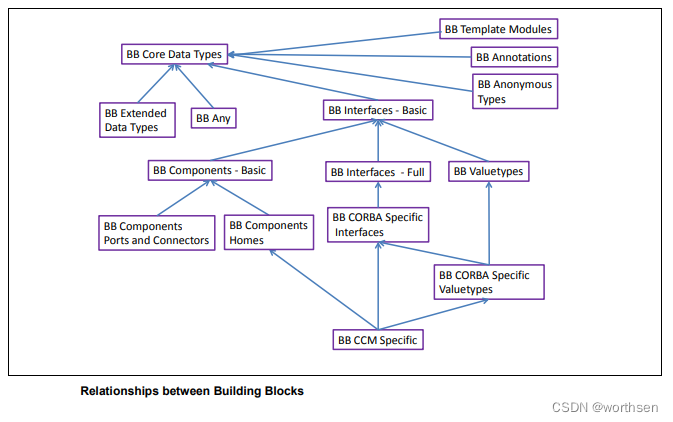
3 补充
3.1 OMG介绍
OMG成立于1989年,是一个开放的会员制、非盈利的计算机行业标准联盟。为可互操作、可便携和可复用的分布式、异构环境下的企业应用程序,制定和维护计算机行业规范。会员包括资讯科技供应商、终端用户、政府机构和学术界。
OMG的成员公司按照成熟、开放的流程编写、采用和维护其规范。OMG的规范实现模型驱动架构(MDA),通过对企业的全生命周期方法最大化ROI集成,包括多种操作系统、编程语言、中间件和网络基础设施,以及软件开发环境。
详见:http://www.omg.org/
3.2 CORBA
- CORBA,Common Object Request Broker Architecture,公共对象请求代理体系结构。由OMG组织制订的一种标准的面向对象应用程序体系规范。或者说 CORBA体系结构是OMG为解决分布式处理环境(DCE)中,硬件和软件系统的互连而提出的一种解决方案。
- 现在CORBA用的已经很少了,基本上只有一些大的电信项目还在用,现在同类的解决方案中WebService是比较流行的。
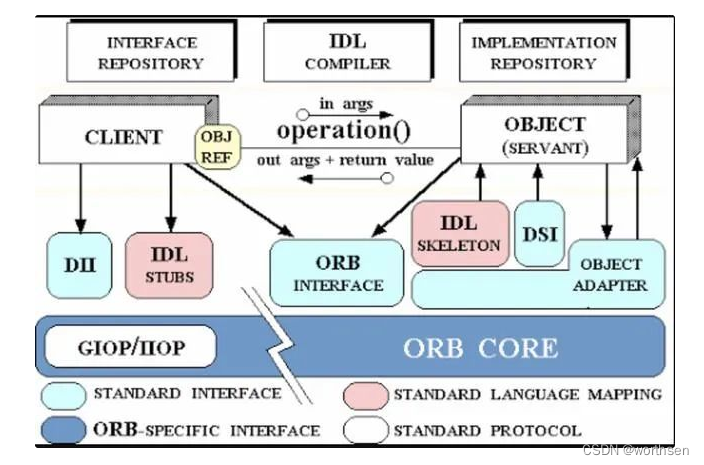
XML-RPC / SOAP
XML-RPC发表于1998年,由UserLand Software(UserLand Software)的Dave Winer及Microsoft共同发表。后来在新的功能不断被引入下,这个标准慢慢演变成为今日的SOAP协议。
REST
REST是当今最为流行的API。因为大量的Web应用采用REST作为其API的选择。REST是 Representational State Transfer 的缩写。是Roy Thomas Fielding博士于2000年在他的博士论文中提出来的一种万维网软件架构风格。
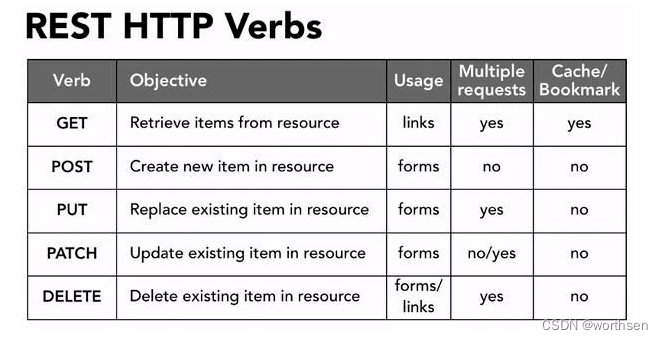
CORBA 和 gRPC 比较
CORBA 和 gRPC 二者的设计,都是为了使客户端相信服务器在同一台机器。客户机在桩(Stub)上调用一个方法(method),调用过程由底层协议透明地处理。
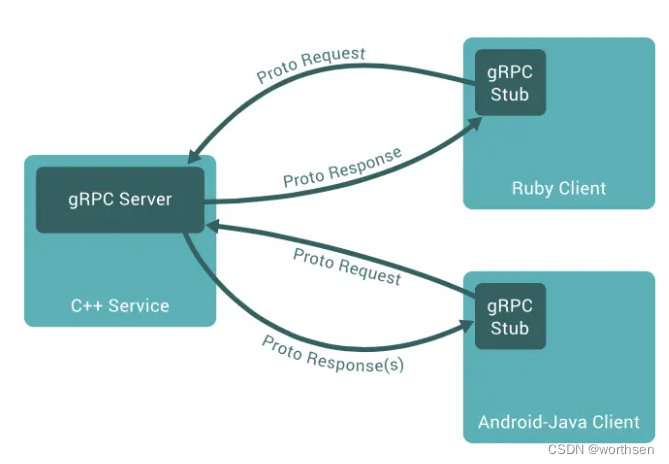
3.3 EBNF(扩展巴科斯范式)
- 扩展巴科斯-瑙尔范式(Extended Backus–Naur Form,EBNF)是一种用于描述计算机编程语言等正式语言的与上下文无关语法的元语法(metasyntax)符号表示法。简而言之,它是一种描述语言的语言。它是基本巴科斯范式(BNF)元语法符号表示法的一种扩展。
- 最初由尼克劳斯·维尔特开发,最常用的EBNF变体由标准是 ISO-14977 所定义。
EBNF的基本语法形式如下,这个形式也被叫做production:
左式(LeftHandSide) = 右式(RightHandSide).
标准ISO/IEC 14977 所定义的符号:
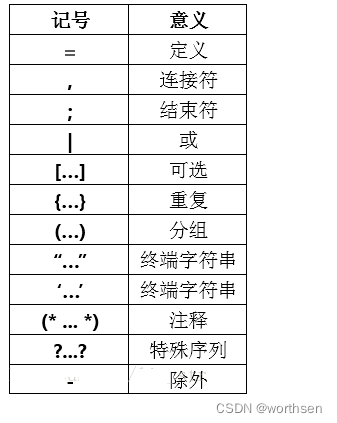
参考
1、OMG–IDL-4.2-PDF
2、wiki-扩展巴克斯-诺尔范式
3、CORBA的简单介绍及HelloWorld
4、扩展巴科斯范式(EBNF)简介
5、架构师该如何为应用选择合适的API
6、远程通信协议:从 CORBA 到 gRPC
